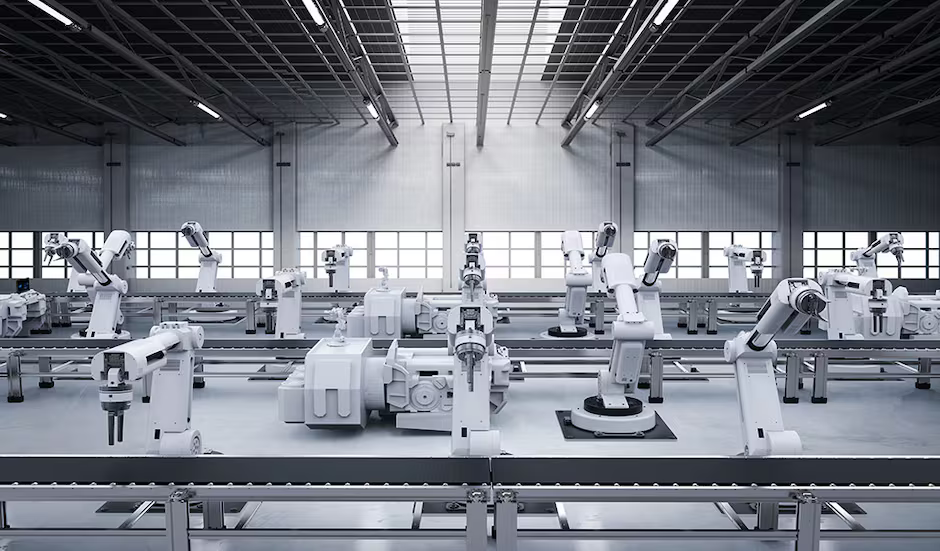Industrial Automation and Factory Robotics: Accelerating the Next Industrial Revolution
Technology Integration TE Technology IntegrationPosted by TEAdmin on 2025-03-10 05:51:17 |
Share: Facebook | Twitter | Whatsapp | Linkedin Visits: 73

Introduction Across industrial facilities and offshore platforms worldwide, a revolutionary transformation is underway. As manufacturers embrace Industry 4.0, they integrate cutting-edge digital technologies to enhance efficiency, flexibility, and production speed, while minimizing unexpected downtime. This industrial evolution is powered by interoperability, which enables machine-to-machine (M2M) communication, deep learning, and intelligent automation through robotic systems and automated guided vehicles (AGVs). The Role of Smart Technologies in Industry 4.0 Modern industrial automation is built on seamless connectivity between machines, real-time data analysis, and predictive intelligence. Several key technologies are driving this change: Robotic Systems Industrial robots have redefined manufacturing by executing precise, repetitive, and high-efficiency tasks. They not only boost productivity but also reduce human errors and ensure worker safety, particularly in hazardous environments such as chemical plants and assembly lines. Automated Guided Vehicles (AGVs) AGVs play a crucial role in material handling and logistics automation. Using advanced AI-powered navigation systems and smart sensors, they transport materials efficiently across production floors, reducing reliance on manual labor and enhancing operational speed. Smart Sensors and Predictive Maintenance The adoption of smart sensors enables manufacturers to collect real-time data, allowing for predictive maintenance strategies. By analyzing machine performance, companies can anticipate failures before they occur, reducing downtime and increasing equipment lifespan. Benefits of Industrial Automation Implementing automation in industrial settings offers several significant advantages: Enhanced Efficiency: Automated systems streamline production by reducing manual intervention and minimizing errors. Cost Reduction: Lower operational costs are achieved through reduced labor dependency, fewer mistakes, and optimized resource utilization. Flexibility and Scalability: Automation enables manufacturers to adapt quickly to changing market demands and customize production lines effortlessly. Improved Safety and Reliability: Robots handle dangerous or repetitive tasks, ensuring worker safety while maintaining consistent performance. The Future of Smart Factories With the convergence of automation, artificial intelligence (AI), and the Internet of Things (IoT), traditional factories are evolving into smart, data-driven production environments. This shift allows manufacturers to optimize production in real-time, improve decision-making, and create customized, sustainable solutions for mass production. Conclusion Industrial automation and factory robotics are shaping the future of modern manufacturing. By integrating intelligent automation and digital connectivity, businesses can enhance productivity, safety, and efficiency. As technology continues to evolve, companies that embrace automation will remain competitive, ensuring long-term success in the digital era. Download our white papers to discover how automation is transforming the manufacturing landscape.
Introduction
Across industrial facilities and offshore platforms worldwide, a revolutionary transformation is underway. As manufacturers embrace Industry 4.0, they integrate cutting-edge digital technologies to enhance efficiency, flexibility, and production speed, while minimizing unexpected downtime. This industrial evolution is powered by interoperability, which enables machine-to-machine (M2M) communication, deep learning, and intelligent automation through robotic systems and automated guided vehicles (AGVs).
The Role of Smart Technologies in Industry 4.0
Modern industrial automation is built on seamless connectivity between machines, real-time data analysis, and predictive intelligence. Several key technologies are driving this change:
Robotic Systems
Industrial robots have redefined manufacturing by executing precise, repetitive, and high-efficiency tasks. They not only boost productivity but also reduce human errors and ensure worker safety, particularly in hazardous environments such as chemical plants and assembly lines.
Automated Guided Vehicles (AGVs)
AGVs play a crucial role in material handling and logistics automation. Using advanced AI-powered navigation systems and smart sensors, they transport materials efficiently across production floors, reducing reliance on manual labor and enhancing operational speed.
Smart Sensors and Predictive Maintenance
The adoption of smart sensors enables manufacturers to collect real-time data, allowing for predictive maintenance strategies. By analyzing machine performance, companies can anticipate failures before they occur, reducing downtime and increasing equipment lifespan.
Benefits of Industrial Automation
Implementing automation in industrial settings offers several significant advantages:
Enhanced Efficiency: Automated systems streamline production by reducing manual intervention and minimizing errors.
Cost Reduction: Lower operational costs are achieved through reduced labor dependency, fewer mistakes, and optimized resource utilization.
Flexibility and Scalability: Automation enables manufacturers to adapt quickly to changing market demands and customize production lines effortlessly.
Improved Safety and Reliability: Robots handle dangerous or repetitive tasks, ensuring worker safety while maintaining consistent performance.
The Future of Smart Factories
With the convergence of automation, artificial intelligence (AI), and the Internet of Things (IoT), traditional factories are evolving into smart, data-driven production environments. This shift allows manufacturers to optimize production in real-time, improve decision-making, and create customized, sustainable solutions for mass production.
Industrial automation and factory robotics are shaping the future of modern manufacturing. By integrating intelligent automation and digital connectivity, businesses can enhance productivity, safety, and efficiency. As technology continues to evolve, companies that embrace automation will remain competitive, ensuring long-term success in the digital era.
Download our white papers to discover how automation is transforming the manufacturing landscape.
Search
Categories
Recent News
- Hyderabad's Crime Rate Drops, But Challenges Remain
- Ferry Service Expansion: A Boost for Tourism in Tamil Nadu
- 'Culture Clash' in Adelaide: Racial Tensions Rise Over Park Usage
- Peace Talks in Abu Dhabi: A Glimmer of Hope Amidst War's Shadow
- Global Risks 2026: Navigating a Decade of Uncertainty
- Chaos in Parliament: PM Modi's Address Postponed Amid Opposition Uproar
- Turkish Airlines Flight Makes Emergency Landing in Kolkata
- Andhra Pradesh's Petrochemical Future: A Mega Project in the Making
Popular News
- Navigating IPO Market Dynamics Amid Volatility and Regulatory Changes
- Massive Worldwide Microsoft Outage Disrupts Multiple Sectors
- Panjapur Bus Stand to Reshape TNSTC Routes
- తెలుగుదేశం పార్టీ - పేదరికాన్ని నిర్మూలించడంలో వాగ్దానం
- Universities Embrace Remote Learning Technologies Amidst Ongoing Pandemic